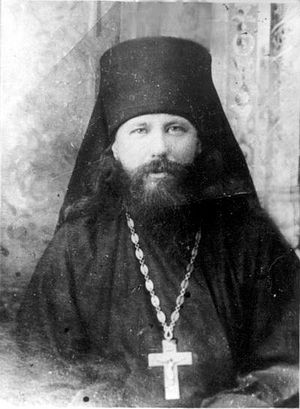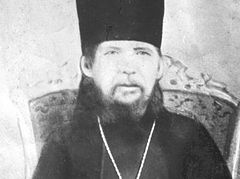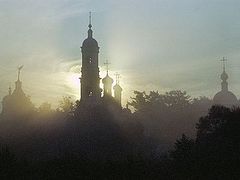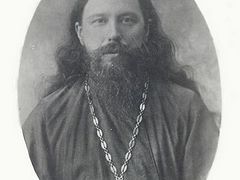Venerable Optina Elder Nikon the Confessor (in the secular world, Nikolai Mitrofanovitch Belyaev)was born on September 26,1888 in Moscow. In childhood, he was part of the large and harmonious family of a merchant. From his parents, he inherited love for the Church, purity, and austerity. In time, Nikolai and his younger brother Ivan discovered and nurtured their conscious calling to religious life. They decided to go off to a monastery, but did not know which one to choose. They listed the names of Russian monasteries on a scroll, which they then cut into strips, and after praying drew one of the strips, on which was written “The Kozelsk Optina Hermitage of the Entry [of the Mother of God into the Temple].”
At home, they encountered no opposition to their good decision, and on February 24, 1907, on the Feast of the Finding of the Head of St. John the Baptist, the brothers arrived at Optina. Venerable Elder Barsonophius reaceived them both with love, but he somehow particularly recognized Nikolai; from the first, they felt some inexplicably close relationship to one another, something known as “spiritual affinity.”
On December 9, 1907, the Feast Dahy of the “Unexpected Joy” Icon of the Mother of God, the Belyaev brothers were received into the brotherhood of the scete. In October 1908, brother Nikolai was appointed secretary to Elder Barsonophius, and was releived of all other obediences excepted chanting and reading. By that time, he had become the closest disciple and confidante of Elder Barsonophius, who, having forseen that he had been predestined for great things, was guiding his spiritual life, passing on to him his own spiritual and life experience, and preparing him to be one of his successors.
In April 1910, Nikolai was tonsured a riassaphore monk, and on May 24, 1915, a stavrophore monk [i.e. the small schema]. He received the name Nikon, after the Holy Martyr Nikon (commemorated September 28). On April 10, 1916, Venerable Nikon was ordained a hierodeacon, and on November 3, 1917, received the rank of hieromonk.
After the October Revolution, Optina was shut down, and persecutions began. Venerable Nikon, then but a novice [person under obedience], wrote in his diary, “I will die, but will not leave…”. Those words expressed the general feeling of the entire Optina brotherhood. To provide for their sustenance, the capable and hard-working monastic organized an “agricultural cooperative.” It was then that Venerable Nikon worked most zealously, doing everything possible to preserve the monastery. Life was difficult in Optina, but services in their churches continued. He was first arrested on September 17, 1919. In the Summer of 1923, the monastery was finally shut, and except for 20 workers in the museum, the entire brotherhood was thrown out into the street. Venerable Isaak, then the Monastery Prior, served the final conciliar/cathedral Liturgy in the Kazan Church, turned over the keys to the church to venerable Nikon, blessed him to serve and to receive the faithful for Confession. Thus, in return for his sacred obedience to his Prior, Venerable Nikon became the last of the Optina Elders. At the same time, Venerable Nektary, who had been exiled, began to direct his spiritual children to Venerable Nikon. Before that point, Venerable Nikon had not dared give advice to those who turned to him; once he began receiving people seeking advice, he would always rely on and refer to the words of the Optina Elders. After being driven from the Monastery in June 1924, he took up residence in Kozelsk, served in the Dormition Church, and received people, fulfilling his pastoral duty. During those awful years, the faithful children of the Church were particularly in need of spiritual strengthening and consolaton, and Venerable Nikon was the source of precisely such spiritual support. In June 1927 he was arrested, (along with Fr. Kirill (Zlenko). Venerable Nikon spent three awful years in the “Kemperpunkt” camp.
Upon completion of this term, he was exiled to the province of Arkhangelsk. Before he was to be sent into exile, medical examination revealed that he had a severe form of tuberculosis, and the physician recommended that he ask for a change in the place of exile. Used to acting under obedience, Venerable Nikon asked advice from Fr. Agapit, who had been exiled with him. Fr. Agapit recommended that he not interfere with God's will, and Venerable Nikon humbly accepted that advice.
On August 3/16, 1930, he was “transferred” from Arkhangelsk to Pinega. For a long time, the sick man wandered about in search of housing. Finally, he made an arrangement with a woman of village of Voyepol. In addition to setting a high price, she also demanded that batiushka work as a farm laborer, and perform all of the heavy work. Venerable Nikon's health progressively worsened, and with each day, he became more undernourished. Once, because of work beyond his capacity, he could no longer stand, she drove him out of the house.
Fr. Peter (Drachev), one of the others exiled from Optina, took the dying man into his own home in a neighboring village, and took care of him. The physical suffering endured by the faithful servant of God did not dampen his spirits: immersed in prayer, he shone with unearthly joy and light. IN the last months of his illness, he communed of the Holy Gifts of Christ almost every day. On June 25 / July 8, 1931, the day of his blessed repose, he communed, and listened to the reading of the canon for the departure of the soul. The deceased's face was unusually pale and bright, with a joyous smile. By God's providence, among those gathered for the funeral of the Elder who had met a blessed end, there were twelve clergymen. His funeral and burial in the village cemetery in Valdokurie were served following the monastic rite. The Lord, who had granted His faithful servant a peaceful death, also honored him upon his translation, with funeral services consistent with his rank and service.
His memory is fresh in the souls of those who love and remember him. The life of the righteous begins after their death…
From: Parish Life, a publication of the Russian Orthodox Cathedral of St. John the Baptist (July 2018).
Used with permission.




